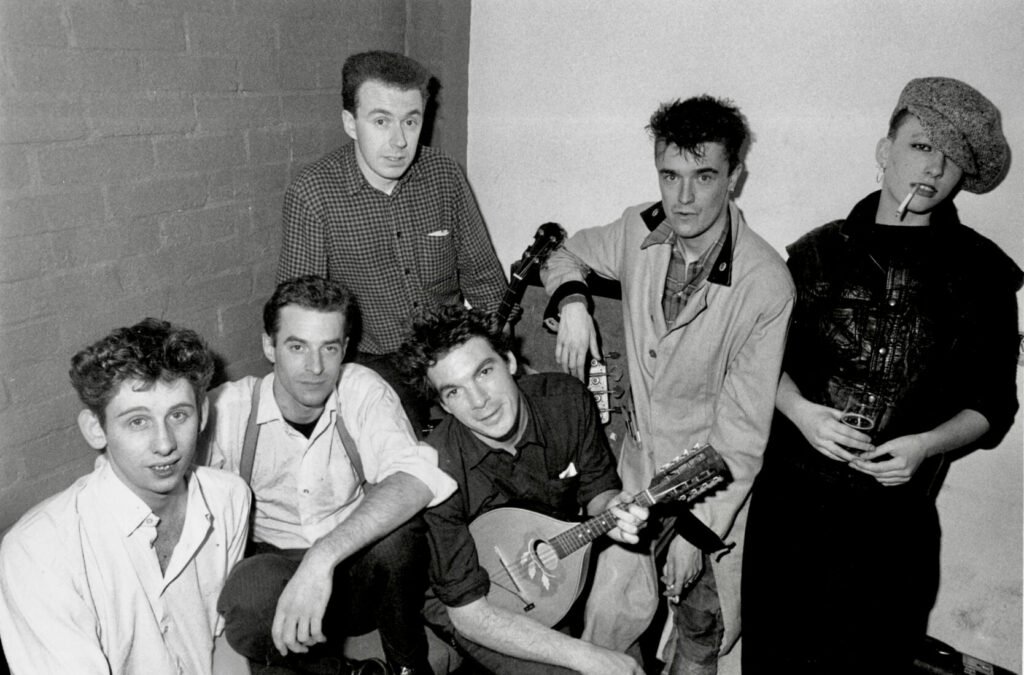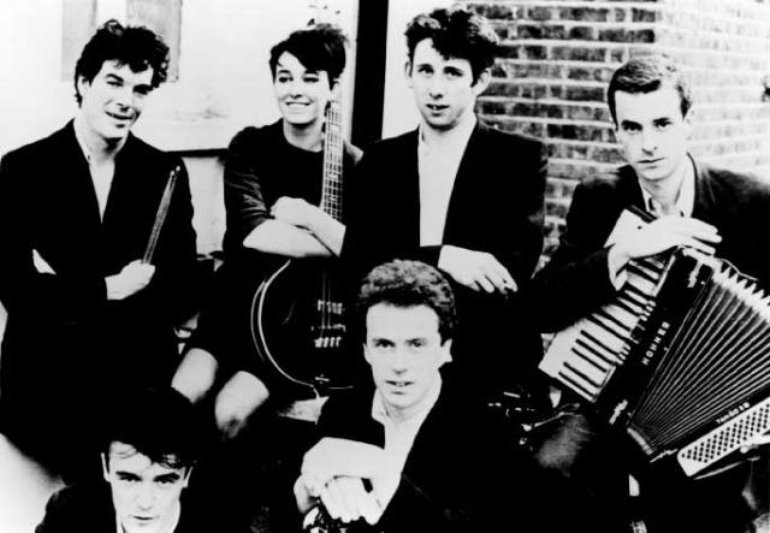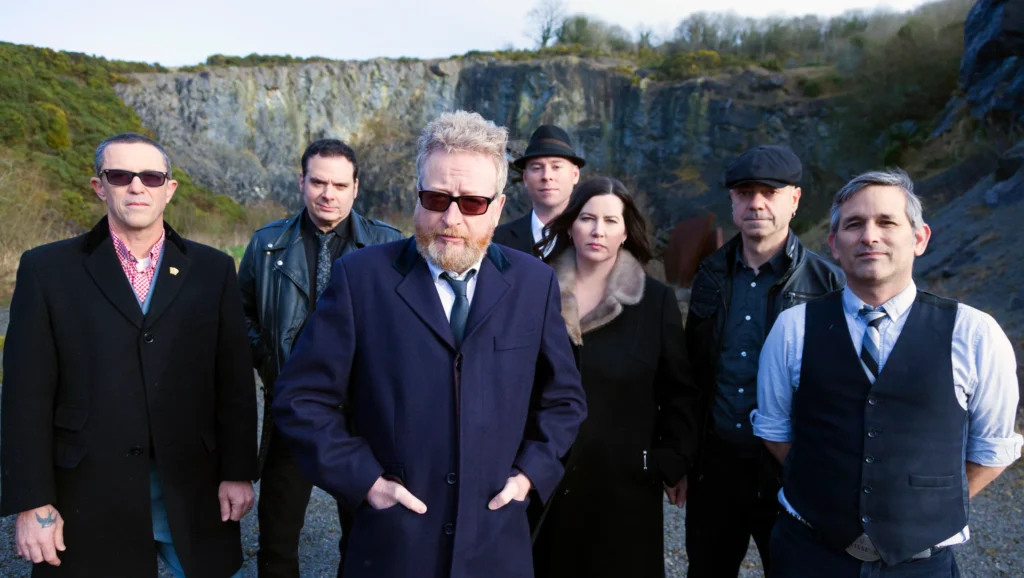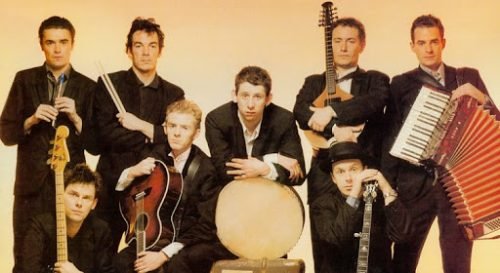In the vibrant and tumultuous landscape of the 1980s music scene, a band emerged that would irreversibly meld the raucous spirit of punk rock with the deeply rooted traditions of Irish folk. The Pogues, formed in Kings Cross, London in 1982, became synonymous with this audacious fusion, crafting a sound that was as unruly and bold as it was melodically rich and historically resonant. Fronted by the charismatic Shane MacGowan, whose lyrical prowess and distinctive vocal style became the band’s hallmark, The Pogues redefined what folk music could be, incorporating elements of punk’s raw energy and defiance.
Discover how The Pogues not only pioneered the Celtic punk genre but also how they inspired a generation of musicians to embrace their cultural heritage through the lens of punk rock rebellion. By breaking down barriers between traditional and contemporary, and between cultural reverence and musical revolution, The Pogues set the stage for a new, vibrant genre that continues to influence artists around the globe.
Background of The Pogues

Before The Pogues burst onto the music scene in the early 1980s, the musical landscape was distinctly divided. On one side, the punk rock movement had taken the world by storm in the late 1970s, characterized by its raw energy, fast-paced rhythms, and a defiant, anti-establishment ethos. Bands like The Sex Pistols and The Clash had given voice to the frustrations and aspirations of a disillusioned youth. On the other side, traditional Irish music remained a vibrant, yet largely separate realm, steeped in folkloric narrative and melodic instrumentation, celebrated in pubs and social gatherings but seldom crossing into the mainstream music charts.
The Formation
The formation of The Pogues marked a groundbreaking merger of these two seemingly disparate worlds. Initially named “Pogue Mahone” (Gaelic for “kiss my arse”), the band was the brainchild of Shane MacGowan, a London-born musician of Irish descent, who grew up immersed in both the punk scene and Irish traditional music. MacGowan teamed up with Spider Stacy on tin whistle, Jem Finer on banjo, James Fearnley on accordion, and later Cait O’Riordan on bass and Philip Chevron on guitar. Each member brought a diverse array of musical influences and backgrounds, from rock and punk to classical and folk, setting the foundation for their unique sound.
Influences
The Pogues were a product of both their environment and their heritage. MacGowan’s songwriting was heavily influenced by traditional Irish music, which he had absorbed from an early age, but also by the punk rock ethos he had embraced as a teenager. This blend was evident in the music they produced, which maintained the narrative depth and melodic appeal of Irish folk while infusing it with the energetic, often anarchic spirit of punk. Their early works, such as the albums “Red Roses for Me” and “Rum, Sodomy & the Lash,” showcased this fusion, integrating traditional instruments like the accordion and mandolin with the aggressive punch of punk rock.
This innovative synthesis did more than just create a new sound; it bridged cultural gaps, bringing Irish folk music into the contemporary conversation and injecting a fresh, rebellious spirit into the genre. The band’s ability to resonate with audiences across different backgrounds made them a symbol of cultural fusion, reflecting a broader movement towards global musical influences that characterized the 1980s. This period in music history thus not only saw The Pogues reinventing folk but also helped lay the groundwork for the development of a new genre: Celtic punk, which would go on to influence countless artists and bands around the world.
Emergence of Celtic Punk

Celtic punk is a genre that combines the rebellious energy and ethos of punk rock with the traditional melodies, instruments, and lyrical themes of Celtic music, particularly Irish and Scottish folk. Characterized by its raucous, energetic sound and often politically charged or socially conscious lyrics, Celtic punk is a vibrant expression of cultural identity melded with punk’s DIY principles and anti-establishment stance. The genre typically features traditional folk instruments such as tin whistles, fiddles, banjos, and bagpipes, alongside the electric guitar, bass, and drums typical of punk music.
Crafting the Celtic Punk Sound
The Pogues were pivotal in the emergence of this genre. Their unique sound was a revolutionary blend that respected the intricacies of Irish folk while injecting it with the raw, unfiltered essence of punk. This synthesis was not just about combining sounds but was also a cultural statement, reflecting the band’s deep-rooted Irish heritage and their connection to the punk scene in London. Shane MacGowan’s lyricism, often poignant and poetic yet delivered with a gritty, punk rock fervor, became one of the defining elements of Celtic punk.
Two seminal albums that epitomized this new genre were “Rum, Sodomy & the Lash” (1985) and “If I Should Fall from Grace with God” (1988). The former, produced by Elvis Costello, features tracks like “A Pair of Brown Eyes” and “The Sick Bed of Cúchulainn,” which perfectly encapsulate the blend of traditional Irish storytelling with punk’s dynamism. The album’s title, a Winston Churchill quote, and its cover—a pastiche of Théodore Géricault’s painting “The Raft of the Medusa”—hint at the rebellious and enduring spirit of the music within.
“If I Should Fall from Grace with God” marked a further evolution in The Pogues’ sound and ambition. The track “Fairytale of New York,” a duet between Shane MacGowan and Kirsty MacColl, became an iconic Christmas anthem, despite (or perhaps because of) its rough edges and bittersweet narrative. The album also featured “Fiesta” and the title track, both of which showcased the band’s ability to incorporate diverse influences into their sound, from Spanish folk to Middle Eastern melodies, while still maintaining a distinctively Celtic core.
Cultural Impact

The Pogues’ music, underpinned by Shane MacGowan’s sharp and often poignant lyricism, ventured boldly into themes of politics, poverty, and personal and cultural identity. These themes not only defined their sound but also resonated deeply with a wide range of audiences, reflecting broader social issues of the time and highlighting the struggles of the marginalized.
Lyrics and Themes
Politics and social commentary were staples in The Pogues’ music, delivered through a lens that was both critically aware and intensely personal. Songs like “Birmingham Six,” a vehement outcry against wrongful imprisonment, underscored the band’s readiness to address political injustices head-on. Similarly, “Streets of Sorrow/Birmingham Six” highlighted issues of police brutality and miscarriages of justice, topics that were and remain highly relevant. These protest songs were embedded within the broader narrative of Irish history and struggles, resonating with listeners who experienced or were aware of such injustices.
Poverty is another recurring theme in The Pogues’ lyrics. Tracks like “The Old Main Drag” starkly depict the harsh realities of life on the streets, while “Fairytale of New York” offers a bittersweet portrayal of immigrant life, aspiration, and failure, all set against a Christmas backdrop. These songs reflect the socio-economic challenges faced by many during the 1980s, marked by high unemployment and social disenfranchisement, particularly in urban areas.
Identity—especially Irish identity—plays a central role in their music. In songs like “Thousands Are Sailing,” The Pogues explore the diasporic experience, capturing the emotional landscape of Irish emigrants who left their homeland in search of better lives, only to face new challenges abroad. This exploration of identity not only offered a form of cultural preservation but also an affirmation of Irish heritage and history, seen through the prism of punk’s subversive lens.
Impact on Audiences and Broader Reception
The Pogues’ approach to these themes struck a chord not just in Ireland, but across the UK and internationally, where their music offered a voice to those often silenced or sidelined by mainstream culture. The band’s gritty, honest portrayal of life’s darker sides, combined with their celebration of Irish culture, provided a dual sense of kinship and resistance that appealed to a diverse audience.
In the UK, The Pogues challenged prevailing narratives about Irish immigrants and culture, often stereotyped in British media and popular culture. Their success and critical acclaim demonstrated a significant shift in how Irish music and identity were perceived in the broader UK music scene. Internationally, especially in places with large Irish diasporic communities like the United States and Canada, The Pogues’ music helped to renew interest in Celtic heritage, and their influence was instrumental in the proliferation of Celtic punk bands who embraced and adapted these themes for their local contexts.
Influence on Other Artists

The Pogues not only revolutionized the fusion of punk rock and traditional Celtic music but also laid the groundwork for a flourishing genre that has inspired a wide array of bands and artists around the globe, particularly within the Celtic punk scene. Their pioneering efforts have resonated across continents, embedding their influence deeply in both the musical and cultural landscapes of various regions, notably the United States and Canada.
Direct Influence
One of the most direct lines of influence from The Pogues can be seen in bands like Dropkick Murphys and Flogging Molly, both of whom have carried the torch of Celtic punk into the 21st century. Boston’s Dropkick Murphys blend Irish folk melodies with punk energy in a way that echoes The Pogues’ original ethos but with a distinctly American flavor. Their songs often touch on themes similar to those explored by The Pogues, such as working-class pride, resilience, and cultural heritage, as seen in tracks like “Shipping Up to Boston.”
Flogging Molly, formed in Los Angeles by Dublin-born Dave King, mixes traditional Irish instruments and melodies with fast-paced punk rhythms. Their music, from the poignantly reflective “Float” to the rebellious “Drunken Lullabies,” showcases a lyrical depth and musical vigor that are reminiscent of The Pogues’ pioneering spirit. Both bands cite The Pogues as a significant influence, not just in their sound but also in their approach to songwriting and storytelling.
Spread to Other Regions
The influence of Celtic punk, spearheaded by The Pogues, has spread extensively, particularly in North America. Canadian bands such as The Real McKenzies and The Mahones have also embraced and adapted the Celtic punk sound, incorporating Scottish and Irish influences, respectively. The Real McKenzies integrate bagpipes seamlessly into punk rock, while The Mahones have been known to blend heartfelt ballads and rousing anthems in their extensive discography, continuing the legacy of blending poignant narratives with energetic performances.
Evolution and Contemporary Adaptations
The genre has evolved as contemporary bands have taken the foundation laid by The Pogues and infused it with local and modern influences. Bands like The Tossers from Chicago and Black 47 from New York have adapted the Celtic punk sound to reflect their own unique perspectives and regional influences. Black 47, known for their politically charged lyrics, have tackled issues like civil rights and urban strife, reflecting the social consciousness of their New York City base.
Younger bands such as Flatfoot 56 and The Rumjacks have also emerged, offering their takes on the genre by blending Celtic musical traditions with contemporary punk, ska, and hardcore elements. These bands have not only expanded the geographical reach of Celtic punk but have also diversified the sounds and themes associated with the genre, ensuring its ongoing relevance and vibrancy.
Legacy and Influence
The Pogues’ ability to weave complex historical and social narratives into their music not only defined a genre but also helped elevate the discourse around these critical themes in popular music. Their impact on Irish identity and music was profound, reshaping perceptions and encouraging a deeper engagement with the cultural forces that shape our societies. As pioneers of Celtic punk, The Pogues left an indelible mark on the music world, proving that music can be a powerful medium for cultural expression and social change.
